Only an urgent order from the International Court of Justice (ICJ) to Israel to immediately stop its military assault on Gaza can arrest the unfolding genocide against the Palestinians there, says South Africa.
South Africa’s legal team at The Hague said on Thursday that 23,210 Palestinians had been killed in the first three months of Israel’s attack on Gaza and more were dying even as the court deliberated.
https://www.youtube.com/watch?v=HVV8adzzcH8
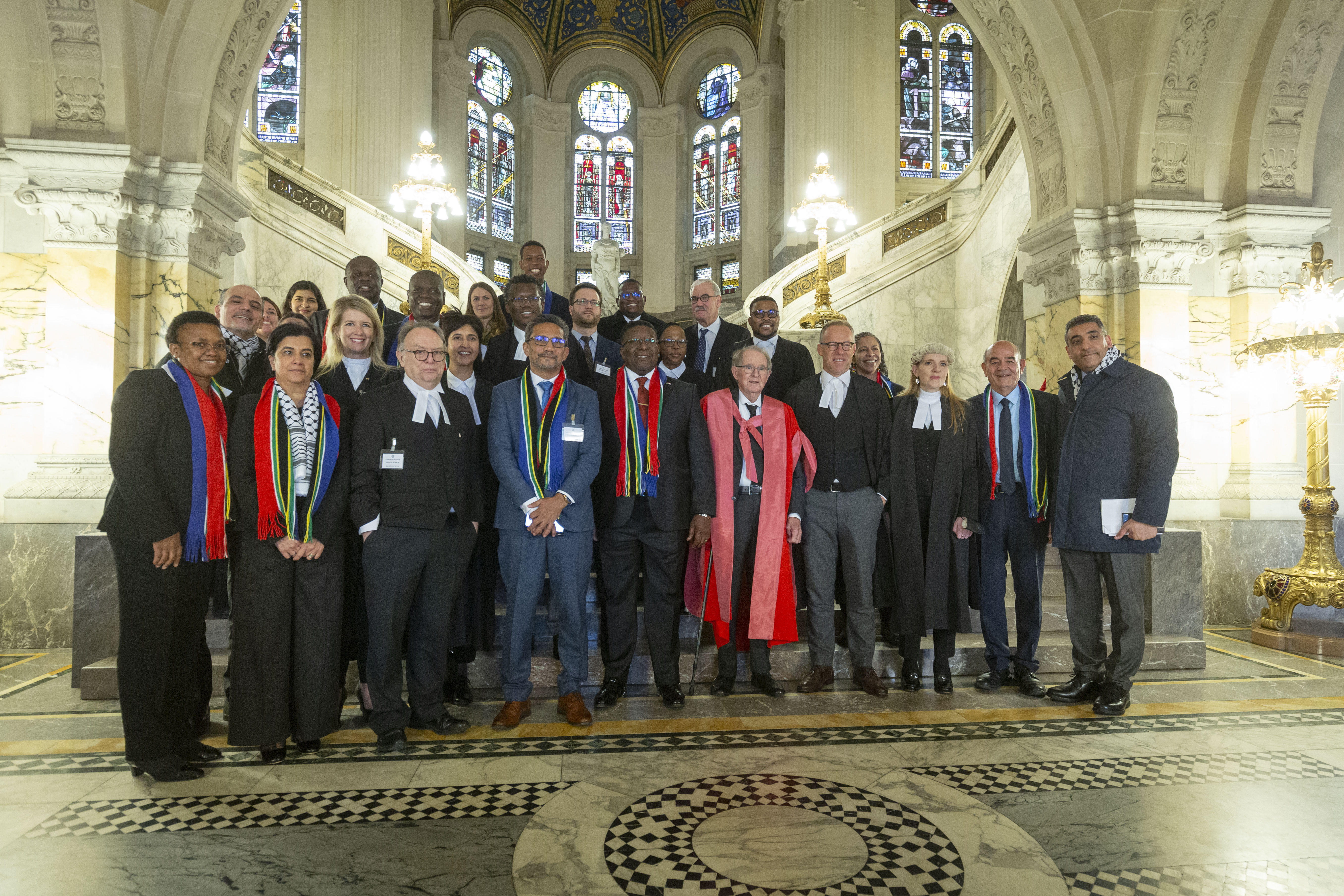 The South African delegation poses for a photo in The Hague, The Netherlands on 11 January 2024. (Photo: Michel Porro / Getty Images)
The South African delegation poses for a photo in The Hague, The Netherlands on 11 January 2024. (Photo: Michel Porro / Getty Images)
Advocate Adila Hassim said: “Every day there is mounting and irreparable loss of life, property, dignity and humanity for the Palestinian people… Nothing will stop this suffering, except an order from this court.
“Without it, the atrocities would continue; with the Israel Defense Forces indicating that it intends pursuing this course of action for at least a year.”
SA submitted a request to the ICJ that Israel’s military assault on Gaza transgressed its obligations under the 1948 Genocide Convention.
The court will rule much later on whether Israel has been carrying out genocide in Gaza. But South Africa’s plea on Thursday — which Israel will answer on Friday — was for the ICJ to provisionally order Israel to immediately cease its military assault on Gaza, including stopping specific acts of genocide, pending the final determination of the case.
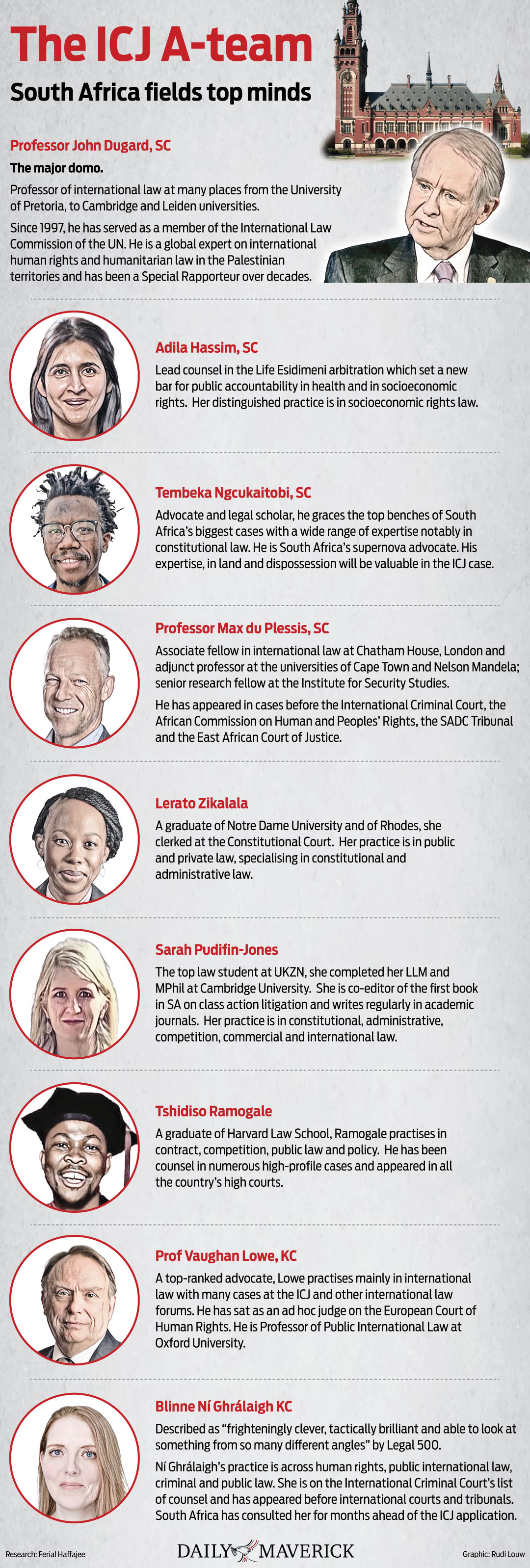
The court could issue this provisional order as early as next week.
‘Genocidal intent’
As South African advocate Max du Plessis argued, it is only necessary for the court to decide that Israel is “plausibly” committing acts of genocide in Gaza for it to order provisional measures.
Hassim contended that Israel had transgressed Article II of the convention, by committing actions that fall within the definition of acts of genocide and which showed “incontrovertibly a pattern of conduct and related intention that justifies a plausible claim of genocidal acts”.
The acts included:
- Specifically targeting Palestinians living in Gaza;
- Using weaponry — including 2,000-pound bombs — that causes large-scale homicidal destruction;
- The deliberate sniping of civilians; and
- Designating safe zones for Palestinians to seek refuge and then bombing these.
Less directly, she said, Israel had demonstrated genocidal intent by:
- Depriving Palestinians in Gaza of basic needs — food, water, healthcare, fuel, sanitation and communications;
- Destroying social infrastructure such as homes, schools, mosques, churches, and hospitals; and
- Killing, seriously injuring and leaving large numbers of children orphaned.
Hassim said Israel had killed 23,210 Palestinians to date, at least 70% of whom were believed to be women and children. “Some 7,000 Palestinians are still missing, presumed dead under the rubble.”
Read more in Daily Maverick: Israel-Palestine War
Israel has argued that it is targeting only Hamas and has never intended to kill Palestinian civilians. It largely blames their deaths on Hamas, which it says has used them as human shields.
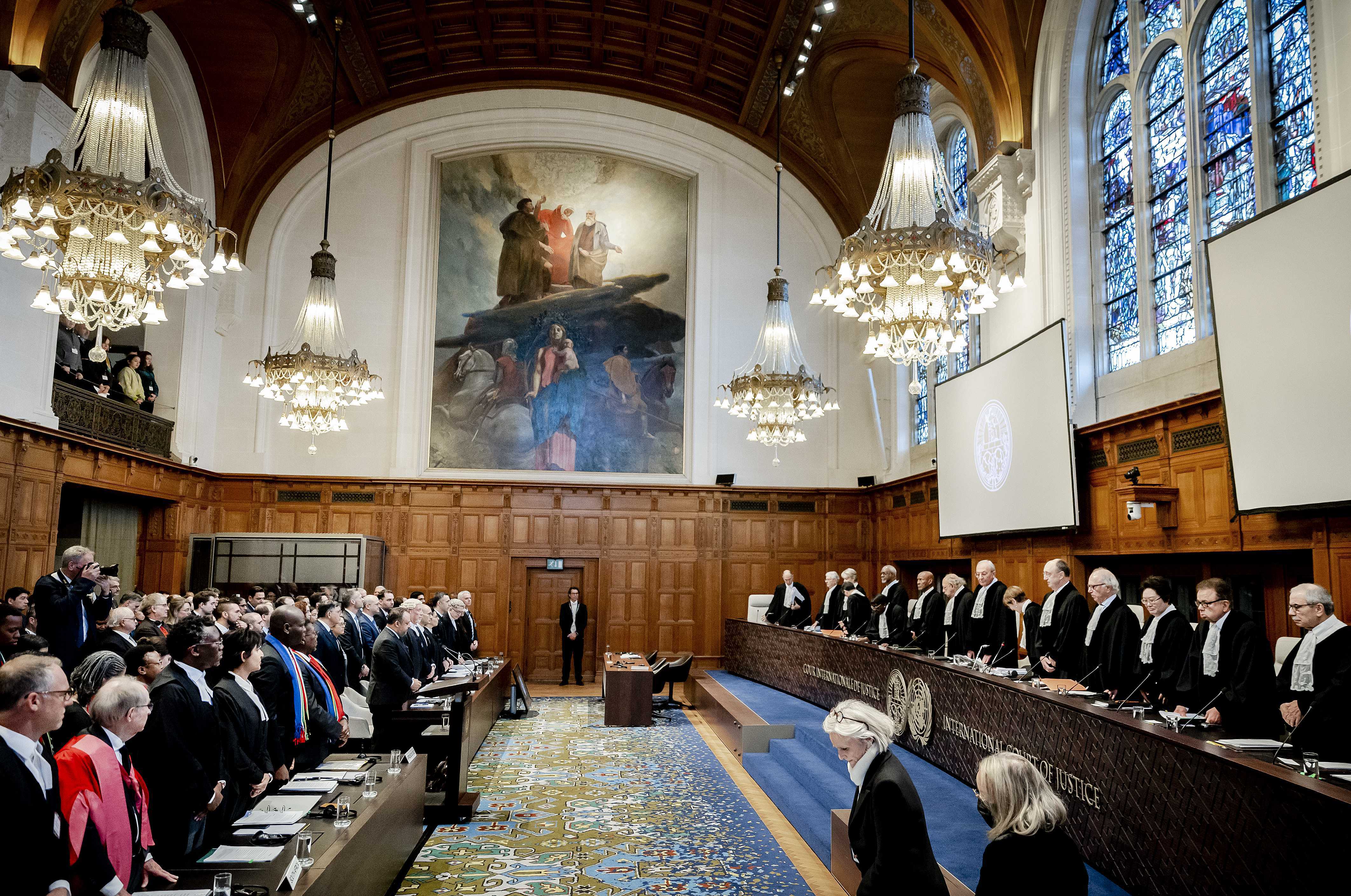 Joan Donoghue (sixth from right), President of the International Court of Justice and other ICJ judges, prior to the hearing of the genocide case against Israel brought by South Africa, in The Hague, The Netherlands, on 11 January 2024. (Photo: EPA-EFE / Remko de Waal)
Joan Donoghue (sixth from right), President of the International Court of Justice and other ICJ judges, prior to the hearing of the genocide case against Israel brought by South Africa, in The Hague, The Netherlands, on 11 January 2024. (Photo: EPA-EFE / Remko de Waal)
But Du Plessis stressed that, “Any motive or effort by Israel to destroy Hamas does not preclude genocidal intent towards the whole or part of the Palestinian people in Gaza. Evidence of other motives explaining its conduct as a perpetrator will not save Israel from a finding that it also possessed the requisite genocidal intent.”
This was because prohibitions on genocide and associated offences were “subject to no exception or qualification. They are absolute in nature, in times of war and peace, always and everywhere.”
‘No ambiguity’
South African advocate Tembeka Ngcukaitobi told the ICJ that perpetrators of grave atrocities usually protested that they were misunderstood.
“What state would admit to a genocidal intent? Yet, the distinctive feature of this case has … been … the reiteration and repetition of genocidal speech throughout every sphere of state in Israel.”
He quoted a host of Israeli officials, including the highest office-bearers, making statements which he said had incited Israeli soldiers to destroy not only Hamas, but the Palestinians as a whole.
 These included Prime Minister Benjamin Netanyahu urging his troops to “remember what Amalek has done to you.
These included Prime Minister Benjamin Netanyahu urging his troops to “remember what Amalek has done to you.
“This refers to the Biblical command by God to Saul for the retaliatory destruction of an entire group of people known as the Amalekites,” Ngcukaitobi said.
The Deputy Speaker of the Knesset, Israel’s Parliament, had called for the erasure of the: Gaza Strip from the face of the Earth.
Defence Minister Yoav Gallant had said in October that Israel was “imposing a complete siege on Gaza” with “no electricity, no food, no water, no fuel” because Israel was “fighting human animals”. He told troops that he had “released all the restraints” on them and that “we will eliminate everything”.
Minister of Energy and Infrastructure Israel Katz had called for the denial of water and fuel as “this is what will happen to a people of children killers and slaughterers”.
“This admits of no ambiguity: it means to create conditions of death of the Palestinian people in Gaza. To die a slow death because of starvation and dehydration or to die quickly because of a bomb attack or snipers,” Ngcukaitobi said.
“The intent to destroy Gaza has been nurtured at the highest levels of state, as President Isaac Herzog has joined the ranks of those signing bombs destined for Gaza,” he said.
Herzog had said, “This rhetoric about civilians not aware, not involved, is absolutely not true … we will fight until we break their backbone.”
He cited several other examples of ministers and parliamentarians similarly denying any distinction between Hamas and civilians in Gaza.
For instance, Minister of National Security Itamar Ben-Gvir said in a televised address on 10 November, “When we say that Hamas should be destroyed, it also means those who celebrate, those who support, and those who hand out candy — they’re all terrorists, and they should also be destroyed.”
Ngcukaitobi said the genocidal message from leaders “is not ambiguous to the Israeli soldiers on the ground. Indeed, it is directing their actions and objectives.”
He played the court a video from Israeli media showing Israeli soldiers dancing and singing, “We know our motto: there are no uninvolved…”; and vowing, “to wipe off the seed of Amalek”
‘A crisis of humanity’
Irish advocate Blinne Ní Ghrálaigh told the judges, “There is an urgent need for provisional measures to protect Palestinians in Gaza...”
She noted that UN Secretary-General António Guterres and other senior UN officials had described the situation in Gaza as “a crisis of humanity”, a “living hell”, a “bloodbath”, a situation of “utter, deepening” and unmatched “horror”, where “an entire population” was “besieged and under attack, denied access to the essentials for survival … on a massive scale”.
Ghrálaigh said the need to issue urgent provisional orders arose “when acts susceptible of causing irreparable prejudice can ‘occur at any moment’ before the court makes a final decision on the case.
“That is precisely the situation here,” she added, because any of the genocidal acts already cited “can and are occurring at any moment”.
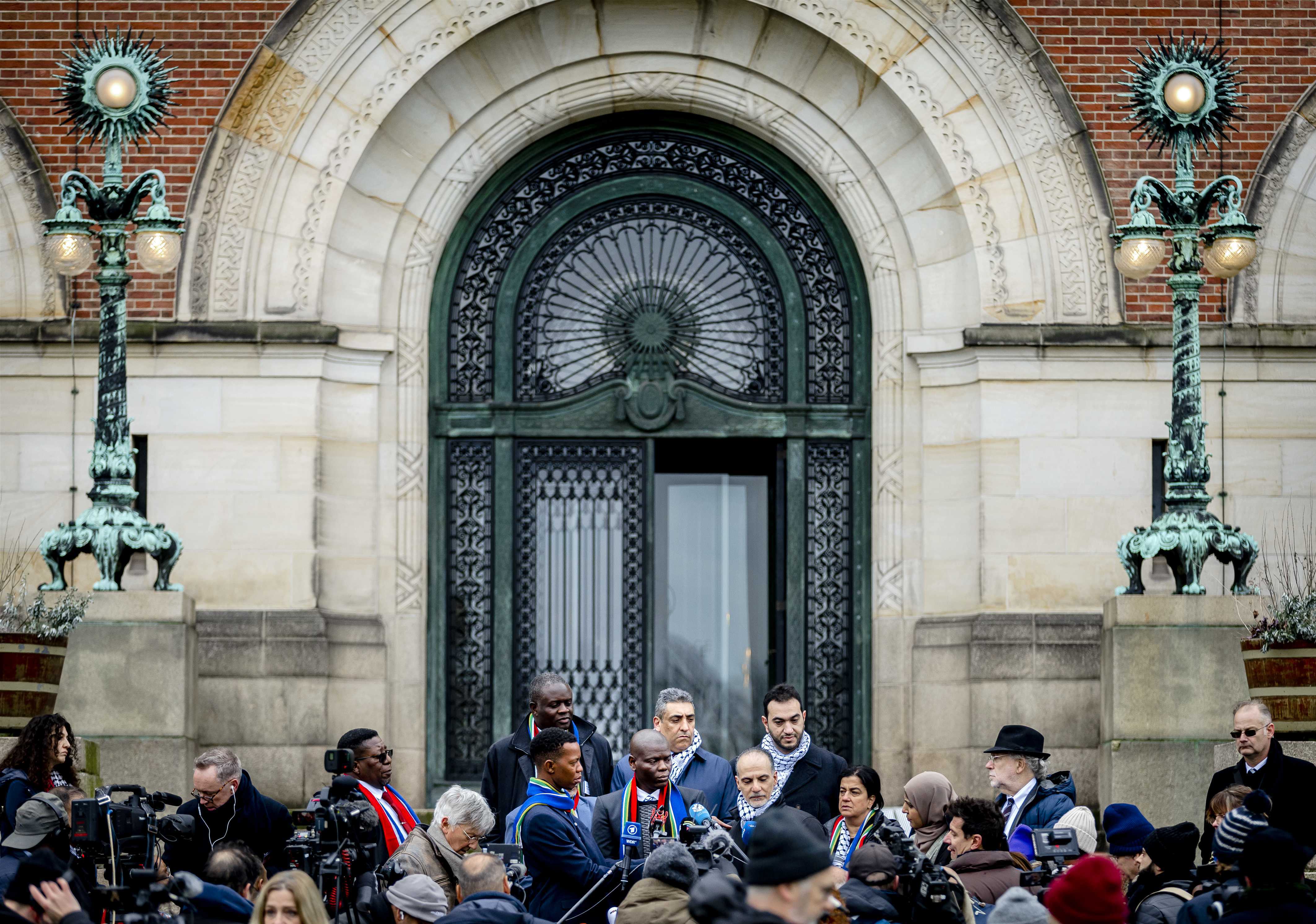 South African Minister of Justice Ronald Lamola (centre) speaks to the press before the International Court of Justice after the first day of the hearing of the genocide case against Israel, brought by South Africa, in The Hauge, The Netherlands, on 11 January 2024. (Photo: EPA-EFE / Remko de Waal)
South African Minister of Justice Ronald Lamola (centre) speaks to the press before the International Court of Justice after the first day of the hearing of the genocide case against Israel, brought by South Africa, in The Hauge, The Netherlands, on 11 January 2024. (Photo: EPA-EFE / Remko de Waal)
Ghrálaigh told the court that in far less urgent cases than the current one, such as Georgia v Russia, Armenia v Azerbaijan, and Canada and the Netherlands v Syria, the ICJ had issued provisional orders.
For example, in the case of Qatar v United Arab Emirates, the court issued a provisional order where harm to about 150 students was in issue.
“In Gaza, 625,000 schoolchildren have not attended school for three months,” she said, with the UN Security Council expressing deep concern that this deprivation of education “has a dramatic impact on children, and that conflict has lifelong effects on their physical and mental health”.
Notably, she said, the ICJ had ordered provisional measures in all three cases where they were sought in relation to violations of the Genocide Convention. In Bosnia v Serbia in 1993 and in The Gambia v Myanmar the ICJ had done that on the basis of evidence that was “certainly no more compelling” than that now before the court.
In the March 2022 Ukraine v Russia case, the court had issued an order that said Russia’s military activities had “resulted in numerous civilian deaths and injuries”, also “creating increasingly difficult living conditions for the civilian population” including making it difficult for them to flee.
“This is occurring in Gaza on a much more intensive scale to a besieged, trapped, terrified population that has nowhere safe to go.”
‘The limits set by international law’
Professor Vaughan Lowe KC warned that Israel might give a unilateral undertaking to comply with all its commitments under the Genocide Convention. But that would not be enough and one reason to doubt it was “Israel’s apparent inability to see that it has done anything wrong in grinding Gaza and its people into the dust.”
Lowe added that Israel could not argue its right to self-defence under Article 51 of the UN Charter because the ICJ had already ruled in a 2004 case concerning Israel’s West Bank wall that the right to self-defence did not apply because the West Bank, like Gaza, was territory under Israel’s control.
“The main point is much simpler. It is that no matter how outrageous or appalling an attack or provocation, genocide is never a permissible response. Every use of force, whether used in self-defence, or in enforcing an occupation, or in policing operations, must stay within the limits set by international law, including the explicit duty in Article I of the convention to prevent genocide.”
“This is not a moment for the court to sit back and be silent,” Lowe said.
He said it was necessary that the court “assert its authority and order compliance with the obligations under the Genocide Convention.
“Indeed, it is hard to think of a case in recent history which has been so important for the future of international law, and of the court.”
‘An unanswerable case’
Commenting on the case, Cathleen Powell, a University of Cape Town international law professor, said South Africa’s legal team had done brilliantly, ticking all the boxes to persuade the ICJ of the need for provisional measures to curb Israel’s actions in Gaza.
She thought that on the evidence presented, Israel could have little to say in response to the appeal for provisional measures, though it would probably have things to say on the charge of genocide.
Powell noted that Israel’s main — in fact, only real — argument so far had been that it had a right to self-defence. But she felt that Lowe had demolished that argument by stressing that the Genocide Convention allowed no exceptions to the bar on genocide.
Powell was also impressed by the way Ghrálaigh kept reminding the ICJ of its standards and its precedents in ordering provisional measures in other cases of lesser severity than this one.
“It seemed to me an unanswerable case. Whatever Israel says tomorrow might have a bearing on the main case but not on the need for provisional measures,” Powell said.
She added that this case might help to turn the tide of events in Gaza. Although she believed it was unlikely that Israel would comply with the sort of measures the ICJ would probably order, she did think Israel might feel the need to make concessions.
If it ignored the court, it would embarrass itself and its allies, she said.
Israel will argue its case on Friday. It had not formally revealed its argument before the hearing, but in a response to SA’s ICJ submission in December, it said, “South Africa’s claim lacks both a factual and a legal basis.
“Israel is committed to international law and acts in accordance with it, and directs its military efforts only against the Hamas terrorist organisation and the other terrorist organisations cooperating with Hamas.
“Israel has made it clear that the residents of the Gaza Strip are not the enemy, and is making every effort to limit harm to the non-involved and to allow humanitarian aid to enter the Gaza Strip.” DM




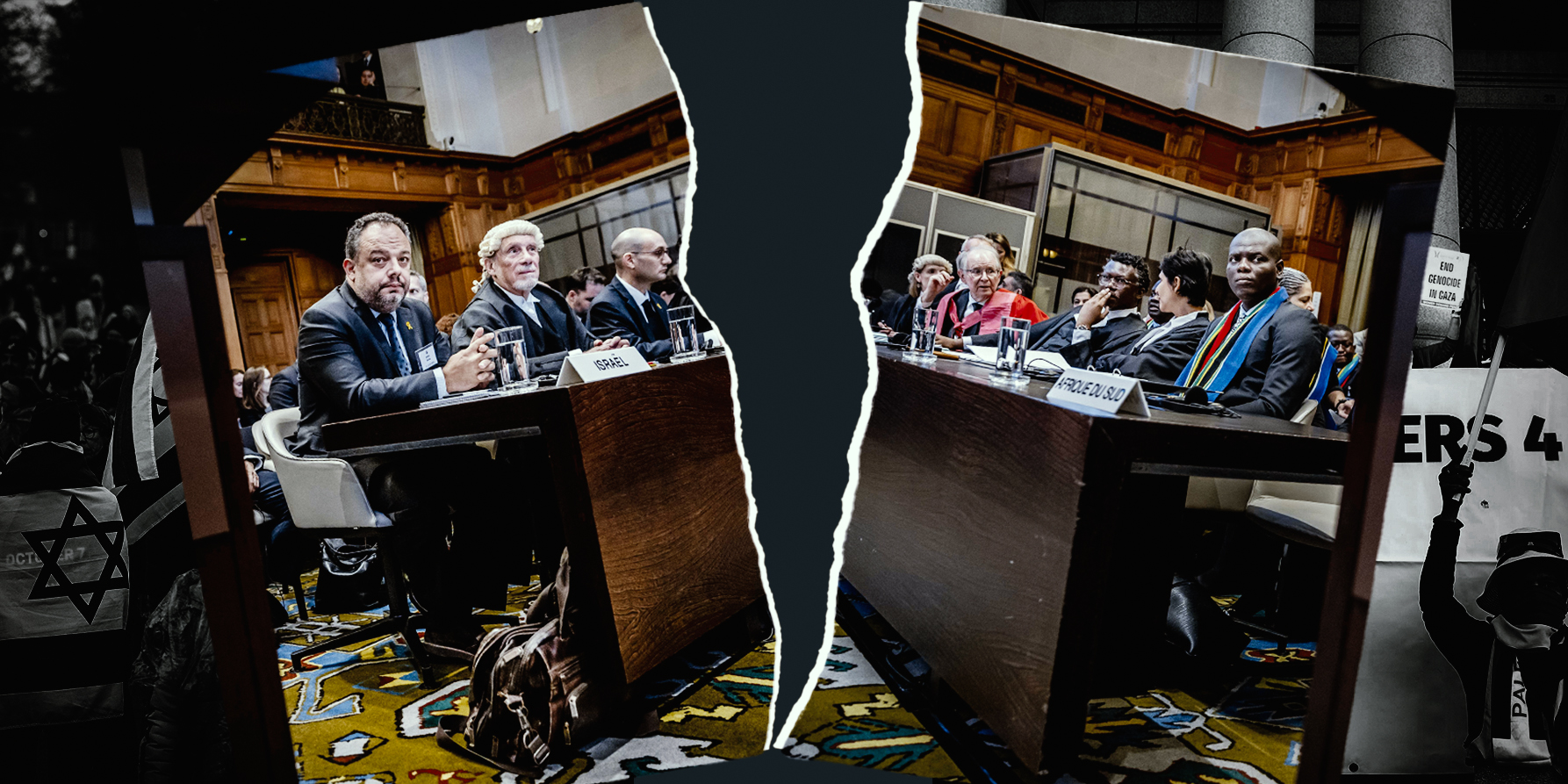 South African Minister of Justice Ronald Lamola (centre) speaks to the press before the International Court of Justice after the first day of the hearing of the genocide case against Israel, brought by South Africa, in The Hauge, The Netherlands, on 11 January 2024. (Photo: EPA-EFE / Remko de Waal)
South African Minister of Justice Ronald Lamola (centre) speaks to the press before the International Court of Justice after the first day of the hearing of the genocide case against Israel, brought by South Africa, in The Hauge, The Netherlands, on 11 January 2024. (Photo: EPA-EFE / Remko de Waal) 